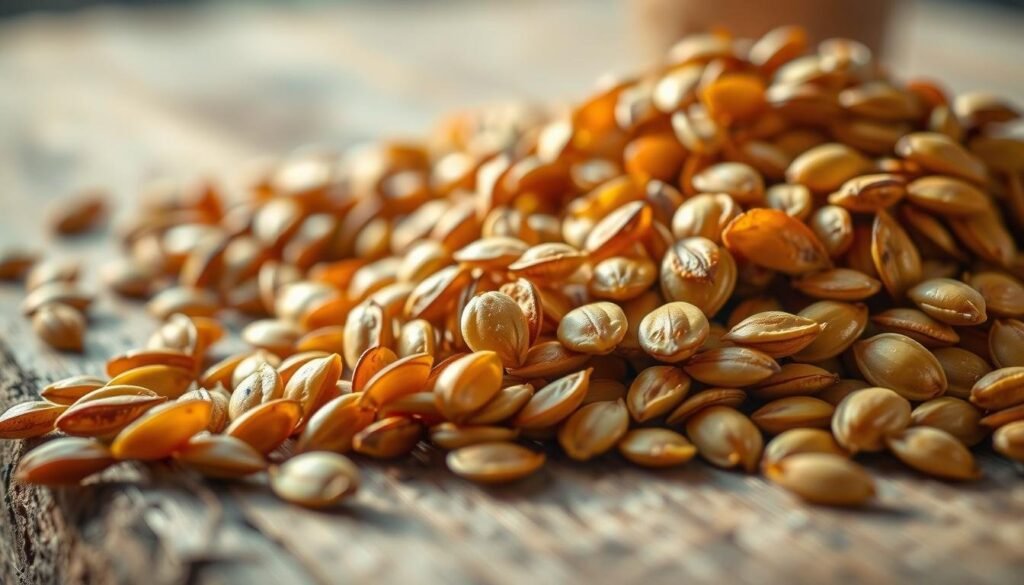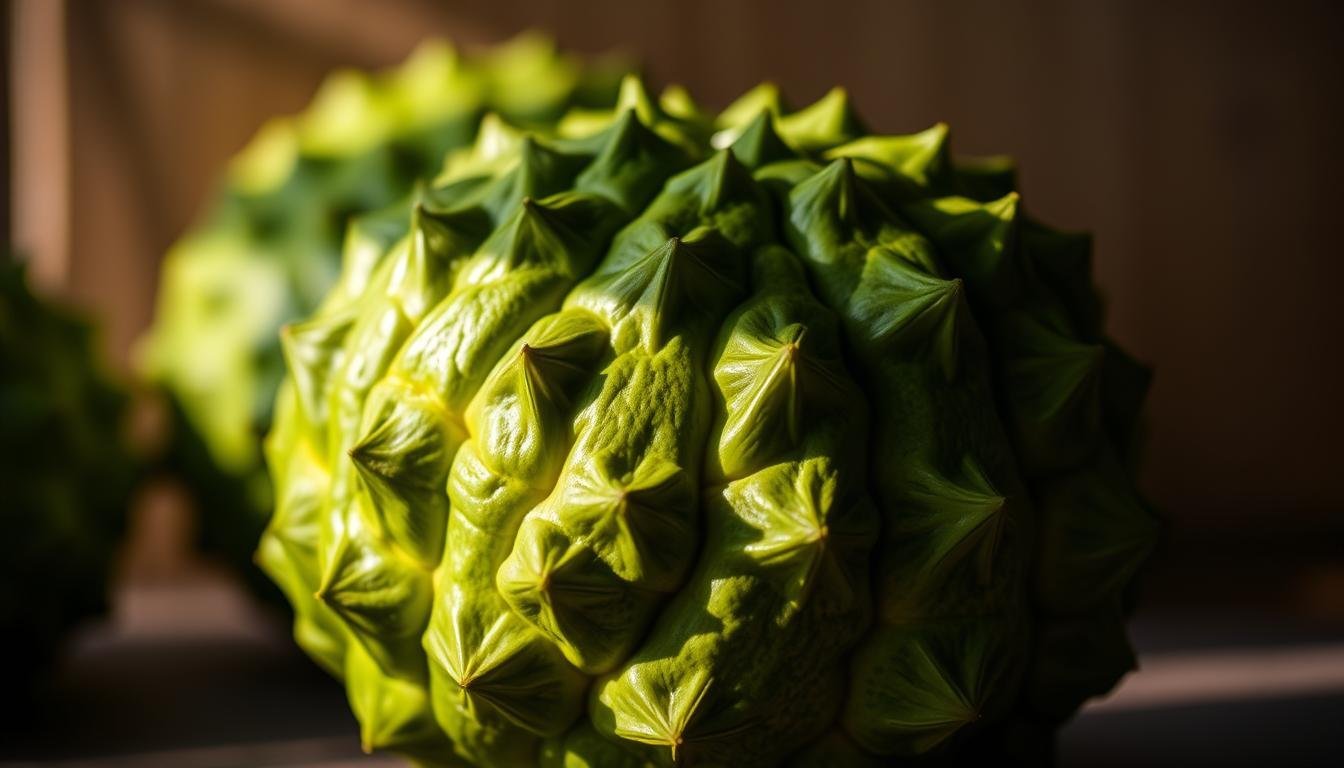Last updated on August 21st, 2025 at 02:46 pm
Can You Eat the Seeds of Horned Melon? Have you ever thought about eating horned melon seeds? This fruit, from Africa, looks unique and might be good for you. When trying new fruits, it’s key to know what’s safe to eat.
This article will look closely at horned melon seeds. We’ll talk about their nutrients and any dangers of eating them. Knowing more about this fruit helps you decide if it’s right for your meals.
Contents
- 1 What Is Horned Melon?
- 2 Can You Eat the Seeds of Horned Melon?
- 3 Nutritional Value of Horned Melon Seeds
- 4 Health Benefits of Consuming Horned Melon Seeds
- 5 How to Select and Prepare Horned Melon
- 6 Ways to Eat Horned Melon Seeds
- 7 Culinary Applications and Recipes
- 8 Conclusion: Can You Eat the Seeds of Horned Melon?
- 9 FAQ
- 9.1 What is horned melon, and where does it come from?
- 9.2 Are horned melon seeds safe to eat?
- 9.3 What are the nutritional benefits of horned melon seeds?
- 9.4 How do I select a ripe horned melon?
- 9.5 How can I prepare horned melon seeds for consumption?
- 9.6 Can I grow horned melon at home?
- 9.7 Are there any potential allergic reactions or interactions with medications associated with consuming horned melon seeds?
- 9.8 Can I use horned melon seeds as a substitute for other ingredients in recipes?
What Is Horned Melon?
Horned melon is a fruit from Africa that’s both fascinating and healthy. It has a unique spiky skin. This fruit belongs to the Cucurbitaceae family, which includes cucumbers and melons.
The horned melon looks different. Its yellow-orange skin is covered in soft, spiky parts. Inside, you’ll find a jelly-like pulp and many seeds. These seeds are edible and nutritious.
Horned melon is more than just a looker. It’s also packed with nutrients. The seeds are especially good for you. Knowing about horned melon helps us see its worth in cooking.
Can You Eat the Seeds of Horned Melon?
Many people wonder if horned melon seeds are safe to eat. The answer is yes, they are edible. This unique fruit’s seeds are a great addition to your diet.
However, there are a few things to keep in mind. The seeds are covered in a gel-like substance. This part is also safe to eat and packed with nutrients. To enjoy the seeds safely, follow these steps:
- Make sure the fruit is ripe. Unripe horned melons can taste bitter and upset your stomach.
- Wash the seeds and the gel thoroughly to get rid of dirt and bacteria.
- Some like to roast the seeds for extra flavor.
Eating horned melon seeds can boost your diet with protein and healthy fats. Start with a small amount to see how you react.
In short, horned melon seeds are safe to eat and can be a healthy choice for your meals.
Nutritional Value of Horned Melon Seeds
Horned melon seeds are packed with nutrients. They are not just a side product of the fruit. Instead, they are a treasure trove of proteins, dietary fibers, and healthy fats.
These seeds are also rich in vitamins and minerals. They are a great source of vitamin E, a strong antioxidant. They also have various B vitamins, which help with energy and other body functions.
| Nutrient | Amount per 100g | % Daily Value |
|---|---|---|
| Protein | 30g | 60% |
| Dietary Fiber | 20g | 80% |
| Vitamin E | 2mg | 13% |
Eating horned melon seeds can boost your health. They add essential nutrients to your diet. Adding these seeds to your meals is a simple way to improve your nutrition.
Health Benefits of Consuming Horned Melon Seeds
Horned melon seeds are not just good to eat; they are full of nutrients. These nutrients offer many health benefits. Adding these seeds to your meals can greatly improve your diet.
The seeds are full of antioxidants. Antioxidants protect your body from harmful free radicals. This helps lower the risk of heart disease and cancer. They also have anti-inflammatory properties, which can ease arthritis symptoms.
There are many health benefits from eating horned melon seeds. These include:
- Improved digestive health due to their high fiber content
- Enhanced immune function thanks to their rich nutritional profile
- Potential anti-diabetic properties that may help regulate blood sugar levels
Adding horned melon seeds to your diet is a simple way to improve your health. Their nutritional value and health benefits make them a great addition to a healthy diet.
How to Select and Prepare Horned Melon
Learning how to pick a ripe horned melon is key to enjoying its benefits. Look for a fruit with a yellow or orange color. This means it’s ripe. Green or hard melons are not ready yet.
To get ready to eat horned melon, wash it well under running water. This removes dirt and bacteria. Then, cut it open and scoop out the pulp and seeds. You can eat the pulp raw or use it in recipes. The seeds can be roasted or dried for later.
Be careful when handling horned melon. The juice can irritate your face or eyes. To prepare the seeds, rinse them and dry them in a low-temperature oven or dehydrator. You can also roast them in oil until crispy and golden.
By following these steps, you can enjoy horned melon and its seeds in many dishes. Try them in salads or as a snack.
Ways to Eat Horned Melon Seeds
Horned melon seeds are easy to add to your diet. You can use them in many ways, like roasted snacks or smoothies.
Roasting is a simple way to enjoy them. Just spread the seeds on a baking sheet, add olive oil, and roast until crispy. You can also add salt or spices for extra flavor.

- Add them to salads for a crunchy texture and nutty flavor.
- Blend them into smoothies for a boost of protein and fiber.
- Use them as a topping for yogurt or oatmeal.
- Incorporate them into baked goods, such as muffins or bread.
Adding horned melon seeds to your diet can be fun. They bring nutritional benefits and variety to your meals. Try different ways to find your favorite.
Culinary Applications and Recipes
Trying out horned melon can bring a new flavor to your dishes. It’s great in salads, main courses, and more. Its versatility and health benefits make it a standout ingredient.
Horned melon seeds are perfect as a topping for salads or in baked goods. The fruit’s pulp can be eaten raw or cooked. This opens up many possibilities in the kitchen.
| Recipe | Ingredients | Instructions |
|---|---|---|
| Horned Melon Salad | Horned melon, mixed greens, cherry tomatoes | Combine diced horned melon with mixed greens and cherry tomatoes, top with seeds. |
| Horned Melon Smoothie | Horned melon pulp, yogurt, honey | Blend horned melon pulp with yogurt and honey for a refreshing smoothie. |
Horned melon is also good in soups or as a side dish. It brings variety to your meals. Exploring its uses in cooking can be a fun and rewarding experience.
Conclusion: Can You Eat the Seeds of Horned Melon?
Horned melon seeds are not only safe to eat but also very nutritious. They are full of protein, fiber, and important minerals. Eating these seeds can help your digestion and boost your immune system.
You can add horned melon seeds to your meals in many ways. Try roasting them as a snack or use them on salads. Learning how to pick and prepare horned melon is important, but the health benefits are worth it.
To sum up, yes, you can eat horned melon seeds. They are a great addition to your diet. By learning how to prepare and eat them, you can get all the nutritional benefits they offer.
See Also: Eating Honeydew Seeds: What You Need to Know
FAQ
What is horned melon, and where does it come from?
Horned melon is a fruit from southern Africa. It has a spiky outside and a soft inside. It’s also called the “blowfish fruit” or “African horned cucumber.”
Are horned melon seeds safe to eat?
Yes, horned melon seeds are safe to eat. You can roast or eat them raw. They’re full of nutrients.
What are the nutritional benefits of horned melon seeds?
Horned melon seeds are packed with protein, fiber, and healthy fats. They also have antioxidants and other nutrients. These can help your health and well-being.
How do I select a ripe horned melon?
Choose a ripe horned melon that’s slightly soft and has a sweet smell. Stay away from fruits with mold or rot.
How can I prepare horned melon seeds for consumption?
Roast horned melon seeds in the oven or on the stovetop for flavor. You can also eat them raw. Add them to salads, smoothies, or other dishes.
Can I grow horned melon at home?
Yes, you can grow horned melon at home in a warm place. It needs a trellis for support and regular watering.
Are there any potential allergic reactions or interactions with medications associated with consuming horned melon seeds?
Eating new foods can sometimes cause allergic reactions or interact with medications. If you have hives, itching, or trouble breathing after eating horned melon seeds, get medical help.
Can I use horned melon seeds as a substitute for other ingredients in recipes?
Yes, you can use horned melon seeds as a substitute for pumpkin or sunflower seeds. They add a special flavor and texture to dishes.

Hello, I am Bellamy George, a certified nutritionist and food safety specialist from Springfield, IL. With a degree in Food Science, I share research-backed insights on edible foods, seeds, and seafood for safe, informed eating.

